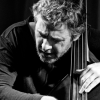Home » Jazz Articles » Profile » Sexteto Bernardo Moreira: Entre Paredes
Sexteto Bernardo Moreira: Entre Paredes
In 1958, Paredes was arrested by the political police (PIDE) of the Portuguese fascist regime and accused of being a member of the illegal Communist Party. During his 18 months in jail, Paredes used to walk around his cell pretending to play the guitar, when in fact he was composing music in his head. In 1962, Paredes started recording and quickly become an idol in the Portuguese music scene.
Very humble and discrete, his guitar sound was noticed by Charlie Haden who also became a hero in Portugal some years later: in 1971, the bass legend played and dedicated his "Song for Che" to the liberation movements in the Portuguese colonies, during the Cascais Jazz Festival, which then led to his arrest by PIDE. Paredes and Haden got to play together live for the first time in 1978, at the Hot Clube de Portugal (Lisbon), in front of 150 lucky jazz fans. They would meet again at a studio in Paris to record Dialogues (Antilles, 1990), which was three years before Paredes retired from music and public life. The album includes seven Paredes original compositions, a traditional fado from Coimbra and Haden's "Song for Che."
Carlos Paredes' music had a great impact in many Portuguese musicians from the next generations. One is Bernardo Moreira, a renowned national jazz figure and son of one of the pioneers of Portuguese jazz with the same name. In 2002, the double bassist released Ao Paredes Confesso (Universal Music, 2002)—playing with the words of a famous Portuguese fado, Nem às Paredes Confesso ("Not Even the Walls I Confess")— along with his brother João Moreira (trumpet), André Fernandes (electric guitar), Nuno Ferreira (electric guitar), André Sousa Machado (drums) and Quiné (percussion). Four songs were Paredes' versions and the other three were composed by Bernardo Moreira, who explained that the album was "basically a group of jazz musicians calling Carlos Paredes to join them, a jazz record made by jazz musicians."
18 years later, Bernardo Moreira edited another tribute album, Entre Paredes (JACC Records, 2021). "Talking about Carlos Paredes is, for me, much more than talking about a genius musician, it's talking about someone who had a huge impact on my career as a musician," he said. "After these years, I realize the effect that all of this had on me, leading me to explore universes that I thought were so far from mine but that, in fact, touch each other, forming, in reality, only one. I felt an unexpected urge to celebrate so many trips between jazz, fado, the song and Coimbra's fado and maybe because of all this I feel Entre Paredes [in english 'Between Walls']."
In this 2021 album, Bernardo Moreira is joined by fellow countrymen João Moreira (trumpet), Tomás Marques (alto and soprano saxophones), Ricardo J. Dias (piano), Mário Delgado (electric guitar) and Joel Silva (drums). All the songs are from Paredes, except "A Morte Saiu à Rua" from singer- songwriter José Afonso, a contemporary of Paredes.
Postponed by the pandemic, the recording took place in 2020, between the 2nd and the 4th of November at the Convento São Francisco, in the city of Coimbra, where Paredes was born. The timeless "Verdes Anos" is the only tune in common in both recordings, but in the latter album we find a unique version, played by the duo piano/trumpet. It probably is the performance that best proves the modernity of the sound of this sextet.
In a concert recorded for TV in October 2021, the sextet had a guest on stage, fado singer Cristina Branco. She sang four songs, one from the first album, "Sede e Morte," another from the second release "Noite Triste" and two others—Fado Moliceiro" and a second vocal take on "A Morte Saiu à Rua," which were not included in either of the records.
< Previous
Voice - Instrument Duos
Next >
Look At Me Now!
Comments
About Bernardo Moreira
Instrument: Bass, acoustic
Related Articles | Concerts | Albums | Photos | Similar ToTags
For the Love of Jazz
 All About Jazz has been a pillar of jazz since 1995, championing it as an art form and, more importantly, supporting the musicians who create it. Our enduring commitment has made "AAJ" one of the most culturally important websites of its kind, read by hundreds of thousands of fans, musicians and industry figures every month.
All About Jazz has been a pillar of jazz since 1995, championing it as an art form and, more importantly, supporting the musicians who create it. Our enduring commitment has made "AAJ" one of the most culturally important websites of its kind, read by hundreds of thousands of fans, musicians and industry figures every month.























